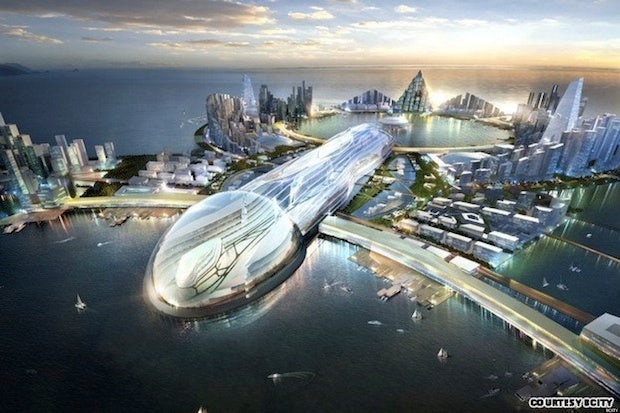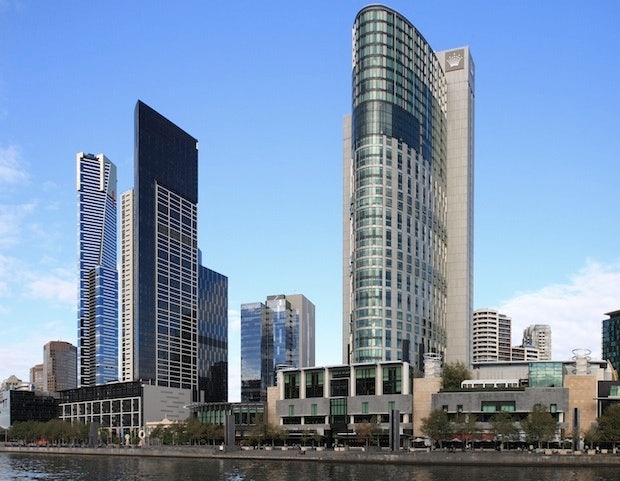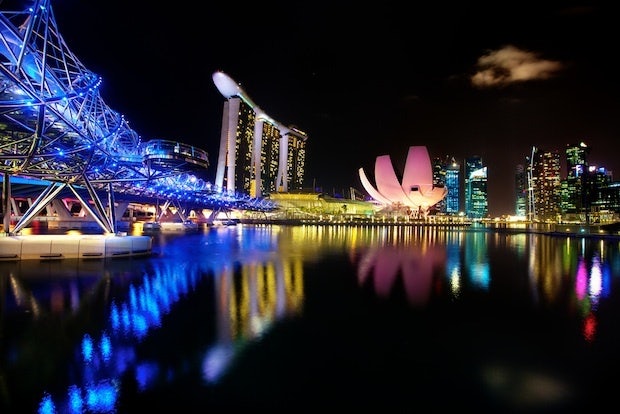
8City, the massive $290 billion gambling complex planned to open in South Korea by 2030. (8City)
Gambling in China may be illegal, but Chinese travelers don’t have to go far to find it—and their options are growing by the minute.
South Korea is the latest country to see a major new gaming development after it approved the construction of its first foreign-owned casino. The recently announced $2.2 billion joint venture project between Las Vegas-based Caesers Entertainment and Hong Kong developer Lippo Ltd. will be located near Seoul’s Incheon Airport, and will face competition from Korean casino operators such as Paradise Co. and Grand Korea Leisure Co.
That’s not the only competition it will face, however, as locations across Asia vie for the attention of moneyed Chinese visitors. The rapid growth of China’s outbound tourist market means that governments are loosening restrictions across Asia. As a result, gaming resorts are cropping up in many locations far from the shores of Macau, Asia's gambling behemoth and playground for the world’s ultra-wealthy.
In order to provide a better picture of what’s going on at Asia’s top gambling destinations, we’ve provided a rundown listing some of the most active Asia-Pacific areas rushing to attract Chinese tourists lured by the thrill of the roulette wheel.
South Korea#
With a focus on the middle class rather than high rollers, South Korea’s gambling industry has centered around Asian travelers. In addition to the new project underway, South Korea already has 16 “foreign-only” casinos located mainly in Seoul and Jeju, as well as a massive $290 billion gambling island slated to open in 2030. Chinese visitors are the main focus, comprising 41 percent of the country’s casino customers in 2012. With many casinos offering much lower minimum bets in VIP rooms than those in Macau, as well as a wide variety of family- and group-friendly amenities such as spas, shopping, restaurants, and shows, South Korea is far more of a playground for China’s upper-middle class than the world’s most super-rich.
Australia#
Australia’s two largest casino companies—Crown Resorts and Echo Entertainment—are locked in an all-out battle to woo middle-class Chinese betters. “While over the last 10 years there has been a significant increase in Chinese tourist arrivals to Australia, we can and should be doing even better given the size and growth of China’s outbound tourism,” Crown Resorts CEO Rowen Craigie told Financial Times this week.

Crown's Eureka Tower on the Yarra River. (Wikimedia)
Vietnam#
Located only about 1.5 hours by plane from southern China, Vietnam saw a 33.5 percent increase in Chinese tourists last year. It’s not stopping there: Vietnamese investors are planning to spend billions on casinos and resorts in the coming years with hopes of attracting Chinese tourists hoping to indulge in some vice on their beach vacation. One of the major developments being planned is a $4 billion resort and casino complex set to be built by Vietnamese asset management company VinaCapital. Other major projects underway include one for $2 billion in Lang Song, another for $4.1 billion in Vung Tau, and one for $4 billion in Phu Yen.
The Philippines#
Top global casino magnates can find common ground in this Southeast Asian gambling destination. Last year, Macau casino mogul Lawrence Ho and Australian counterpart James Packer of Crown teamed up to sign an agreement for the first casino to be built outside of Macau by their partner company, Melco Crown Entertainment. The casino will open in the middle of this year inside a giant complex called Entertainment City, which will hold gaming resorts by four different franchises and is expected to generate up to $10 billion annually when all are completed. That is, if the Chinese government doesn’t stand in the way: China’s Ministry of Foreign Affairs recently instructed citizens not to gamble in the Phillippines due to alleged risks of being detained over debt.
Singapore#
With sights set mainly on big-ticket gamblers, the wealthy Asian city-state brought in about $6 billion in gambling revenue in 2013, a 3.8 percent increase from last year. The Marina Bay Sands, which is owned by Las Vegas Sands Corp., and Genting Group’s Resorts World Sentosa helped push Singapore to the third-largest global gambling spot after Las Vegas and Macau. While Singapore’s mass-market revenues actually flattened over the past year, they were buoyed by the ultra-wealthy VIPs that continue to flock to the tables.

Singapore's Marina Bay, which holds the Marina Bay Sands Casino. (Flickr/Daniel Peckham)
Macau#
Last but not least, no list of Asian gaming destinations is complete without Macau. With its plethora of ultra-high rollers, money-laundering scandals, and even gang activity, the world’s largest gambling center has often been seen as more of a Bond villain hideout than a family-friendly vacation destination. However, the Chinese government’s ant-corruption crackdown showed casino owners that the whales aren’t always a sure bet, so developers have been working to offer more affordable entertainment and gambling options for the crowd who can’t quite afford Macau’s average of $400,000 per gambler spent in VIP rooms. They’re certainly doing something right: Macau produced a record $45.2 billion in gaming revenues last year.